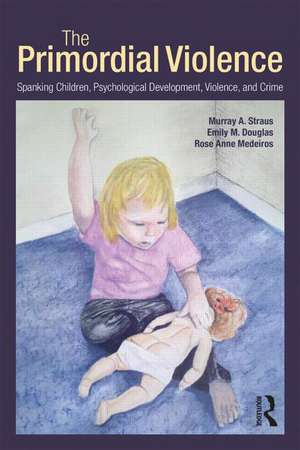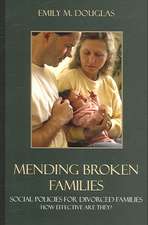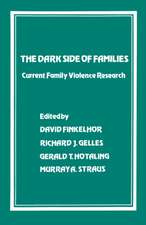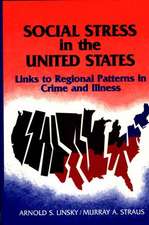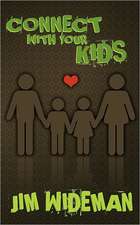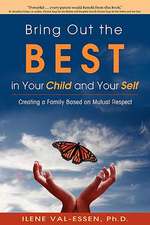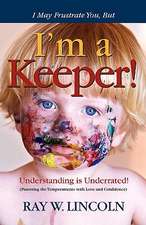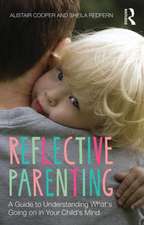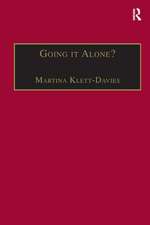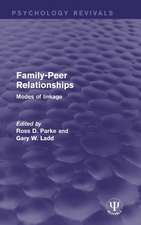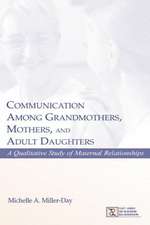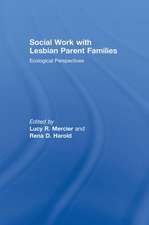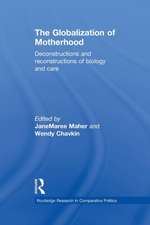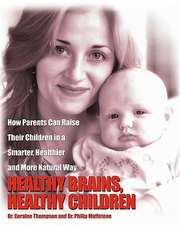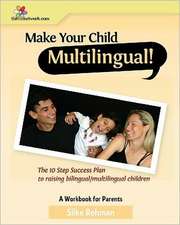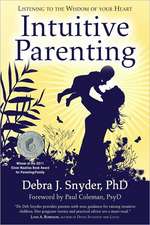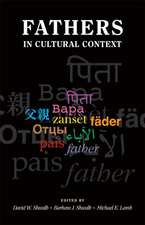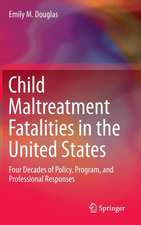The Primordial Violence: Spanking Children, Psychological Development, Violence, and Crime
Autor Murray A. Straus, Emily M. Douglas, Rose Anne Medeirosen Limba Engleză Paperback – 13 aug 2013
Why do parents hit those they love? What effect does it have on children? What can be done to end this pattern? These are some of the questions explored in The Primordial Violence. Featuring longitudinal data from over 7,000 U.S. families as well as results from a 32 nation study, the book presents the latest research on the extent to which spanking is used in different cultures and the subsequent effects of its use on children and on society. Evidence that shows the relationship between spanking and the subsequent slowing of cognitive development and increase in antisocial and criminal behavior is shown. Both cross-sectional and longitudinal studies are explored in an accessible fashion. An abundance of high quality research has produced findings that are highly consistent from study to study which show that spanking is a risk factor for aggressive behavior and other social and psychological problems. Because of these findings, the authors argue for policy changes and recommend a drastic reduction in the use of spanking. Policy and practical implications are explored in most chapters.
The Primordial Violence highlights:
The benefits of avoiding spanking such as the development of better interpersonal skills and higher academic achievement;
The link between spanking and behavioral problems and crime;
The extent to which spanking is declining and why despite the unusually high level of agreement between numerous studies which found harmful effects from spanking, most parents continue to spank.
Part 1 documents the worldwide use of spanking and why parents spank. The possible adverse effects of spanking on children’s behavior and academic achievement, and the potential for violence and criminal behavior in later life, are explored in Parts 2, 3, and 4. Part 5 examines trends in spanking, and suggests what can be done to lower the percent of parents who spank. Contradictory opinions about whether to spank are explored. The book concludes with a call for change in this aspect of parenting which will have profound benefits, for the children and families involved, and society as a whole.
Intended for a general audience of readers who are interested in child development and parenting and for advanced undergraduate and/or graduate courses in child abuse, family violence, juvenile delinquency, criminal behavior, social development, sociology of the family, or parenting and family relations taught in psychology, human development, family studies, criminology, education, social work, sociology, and social policy.
| Toate formatele și edițiile | Preț | Express |
|---|---|---|
| Paperback (1) | 466.68 lei 6-8 săpt. | |
| Taylor & Francis – 13 aug 2013 | 466.68 lei 6-8 săpt. | |
| Hardback (1) | 1809.60 lei 6-8 săpt. | |
| Taylor & Francis – 26 feb 2015 | 1809.60 lei 6-8 săpt. |
Preț: 466.68 lei
Nou
Puncte Express: 700
Preț estimativ în valută:
89.31€ • 92.67$ • 74.65£
89.31€ • 92.67$ • 74.65£
Carte tipărită la comandă
Livrare economică 17-31 martie
Preluare comenzi: 021 569.72.76
Specificații
ISBN-13: 9781848729537
ISBN-10: 1848729537
Pagini: 464
Ilustrații: 75 b/w images and 31 tables
Dimensiuni: 152 x 229 x 25 mm
Greutate: 0.86 kg
Ediția:1
Editura: Taylor & Francis
Colecția Routledge
Locul publicării:Oxford, United Kingdom
ISBN-10: 1848729537
Pagini: 464
Ilustrații: 75 b/w images and 31 tables
Dimensiuni: 152 x 229 x 25 mm
Greutate: 0.86 kg
Ediția:1
Editura: Taylor & Francis
Colecția Routledge
Locul publicării:Oxford, United Kingdom
Public țintă
Professional Practice & DevelopmentCuprins
Part I: Prevalence and Social Causes of Spanking 1. The Social and Scientific Context of Research on Spanking. 2. Corporal Punishment In The United States. 3. Spanking In World Perspective. 4. There was An Old Woman Who Lived In A Shoe. 5. Approval Of Violence And Spanking Children. Part II: Spanking and Child Behavior Problems 6. The Boomerang Effect of Spanking. 7. Impulsive Spanking, Never Spanking And Child Well-Being. 8. The Child-to-Mother Bond and Deliquency. 9. Spanking and Risky Sex. Part III: Spanking and Human Capital 10. Mental Ability. 11. College Graduation. Part IV: Spanking and Human Capital 12. What Explains The Link Between Spanking and Assaulting a Partner? 13. Assault and Injury of Dating Partners by University Students in 32 Nations. 14. Cultural Context & The Relation of Spanking Crime. 15. Spanking High Risk Children and Adult Crime. 16. Sexual Coercion and Sexual Assault. Part V: Social Change and Trends In Spanking 17. The Decline in Approval of Spanking. 18. Why Everyone Spanks Toddlers and What To Do About It. 19. Implications for Crime and Violence in Society. 20. Obstacles to Accepting the Evidence. 21. A World Without Spanking.
Recenzii
"...an excellent exploration of a topic that impacts all families regardless of race, socioeconomics, or nationality. It should be considered a must read by every professional working with parents and children, as well as anyone considering taking on the role of parent. The book has much to contribute to the understanding and response to a world where the increase in the frequency and severity of child-initiated violence appears to be on the rise. Summing Up: Essential. All levels/libraries." – D.A. Mathews, Salisbury University, in CHOICE, March 2014
"An impressive review of decades of research, this book will be a critical resource for academics and all who seek an end to everyday violence against children." – Joan E. Durrant, University of Manitoba, Canada
"The Primordial Violence is a milestone in research on the causes and consequences corporal punishment. Murray Straus and his co-authors convincingly demonstrate the huge social costs of spanking children across the world." – Manuel Eisner, University of Cambridge, UK
"In this important and timely volume, Straus and colleagues integrate decades of research on corporal punishment and significantly advance understanding of the causes and consequences of spanking children. This book is critically important to all practitioners and researchers who work to promote the wellbeing of children." – Shawna J. Lee, University of Michigan, USA
"This is a much needed work which will contribute significantly to the field. …There is no doubting its relevance or quality of its scholarship. ... The strength of the book is 40 years of research and accumulating knowledge." – Penelope Leach, University of London, UK
"[It will] be a very useful tool for professionals who work with families and ... as a ... supplement for college courses that deal with the topic of parenting, child guidance & discipline, or family violence." – Brigitte Vittrup, Texas Women’s University, USA
"It will be of keen interest to scholars who attend NCFR, SRCD, SRA, and other family- and child-oriented meetings ... and to a general audience. .... I would like my graduate students to read [it] ...so that they can get a "feel" for how science is done." – Patricia K. Kerig, University of Utah, USA
"It has significant practical implications for parenting. …[It] …is easy to understand and follow. …Relevant as a supplementary textbook for postgraduate courses on child development, child psychology, criminology, family violence, pediatrics, education, social work, and sociology…this book undoubtedly fills a hole in systematic research evidence on spanking."– Chan Yuk-chung, The Hong Kong Polytechnic University, China
"Attractive to researchers, graduate students, policymakers, and community leaders who are interested in ... preventing family violence ... I would …use [it] for my …course on children and public policy and for a …course on family violence [and] …recommend it to colleagues for its comprehensive review of data on both the use of and effects of corporal punishment in the U.S. and internationally." – Elizabeth Gershoff, University of Texas at Austin, USA
"This volume is a must-read for psychologists, educators, child welfare professionals, and anyone responsible for taking care of children."– Clifton R. Emery, Yonsei University, PsycCRITIQUES
"An impressive review of decades of research, this book will be a critical resource for academics and all who seek an end to everyday violence against children." – Joan E. Durrant, University of Manitoba, Canada
"The Primordial Violence is a milestone in research on the causes and consequences corporal punishment. Murray Straus and his co-authors convincingly demonstrate the huge social costs of spanking children across the world." – Manuel Eisner, University of Cambridge, UK
"In this important and timely volume, Straus and colleagues integrate decades of research on corporal punishment and significantly advance understanding of the causes and consequences of spanking children. This book is critically important to all practitioners and researchers who work to promote the wellbeing of children." – Shawna J. Lee, University of Michigan, USA
"This is a much needed work which will contribute significantly to the field. …There is no doubting its relevance or quality of its scholarship. ... The strength of the book is 40 years of research and accumulating knowledge." – Penelope Leach, University of London, UK
"[It will] be a very useful tool for professionals who work with families and ... as a ... supplement for college courses that deal with the topic of parenting, child guidance & discipline, or family violence." – Brigitte Vittrup, Texas Women’s University, USA
"It will be of keen interest to scholars who attend NCFR, SRCD, SRA, and other family- and child-oriented meetings ... and to a general audience. .... I would like my graduate students to read [it] ...so that they can get a "feel" for how science is done." – Patricia K. Kerig, University of Utah, USA
"It has significant practical implications for parenting. …[It] …is easy to understand and follow. …Relevant as a supplementary textbook for postgraduate courses on child development, child psychology, criminology, family violence, pediatrics, education, social work, and sociology…this book undoubtedly fills a hole in systematic research evidence on spanking."– Chan Yuk-chung, The Hong Kong Polytechnic University, China
"Attractive to researchers, graduate students, policymakers, and community leaders who are interested in ... preventing family violence ... I would …use [it] for my …course on children and public policy and for a …course on family violence [and] …recommend it to colleagues for its comprehensive review of data on both the use of and effects of corporal punishment in the U.S. and internationally." – Elizabeth Gershoff, University of Texas at Austin, USA
"This volume is a must-read for psychologists, educators, child welfare professionals, and anyone responsible for taking care of children."– Clifton R. Emery, Yonsei University, PsycCRITIQUES
